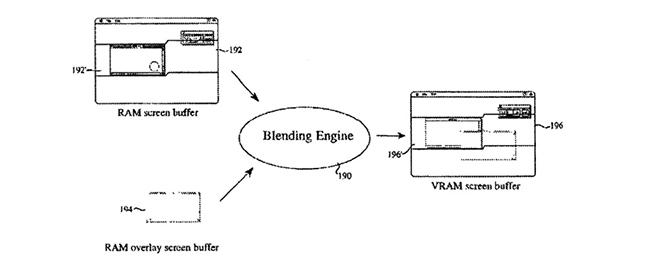USPTO issues preliminary rejection of key claims in Apple translucent images patent
The United States Patent and Trademark Office has issued a decision tentatively rejecting certain aspects of a patent Apple holds on displaying translucent images, a development that could potentially impact Apple's ongoing legal struggles with chief rival Samsung.
An illustration from Apple's U.S. Patent No. RE41,922
Samsung on Friday notified the United States International Trade Commission of the USPTO's preliminary decision, according to FOSS Patents. The patent in question — U.S. Patent No. RE41,922, covering a "Method and apparatus for providing translucent images on a computer display" — saw its claims 29-30 and 33-35 rejected on a tentative basis.
The decision is a First Office Action, the first substantive move from the USPTO that could eventually end up invalidating a patent. In issuing the preliminary rejection, the USPTO found that aspects of Apple's patent were anticipated or obvious in view of U.S. Patent No, 5,581,243, which covers a "Method and apparatus for displaying simulated keyboards on touch-sensitive displays," as well as admitted prior art.
A First Office Action is not binding, and the USPTO may reverse course in the course of its reevaluation of the patent.
Notably, the rejection stemmed from an anonymous request for a reevaluation of the '922 patent. That request, filed in December of 2012, pointed to five examples of prior art, including three U.S. patents and two Japanese patents.
In April, the ITC ruled that Samsung had infringed RE41,922 with the text selection feature of the Android browser and the translucent buttons of the Android photo gallery. Samsung hopes that the USPTO's recent decision could influence the ITC's final ruling, which is scheduled for August 1, 2013.
Despite Apple's landmark $1.05 billion victory against Samsung, the Cupertino has little to show after years of patent litigation. A number of Apple patents have been ruled invalid both in the U.S. and abroad in the course of appeals and reevaluations. So far, four U.S. patents Samsung was found to have infringed have been preliminarily ruled invalid or may be ruled so in the near future.
 AppleInsider Staff
AppleInsider Staff














 Amber Neely
Amber Neely
 Thomas Sibilly
Thomas Sibilly

 William Gallagher
William Gallagher
 Malcolm Owen
Malcolm Owen
 Christine McKee
Christine McKee










25 Comments
The United States Patent and Trademark Office has issued a decision tentatively rejecting certain aspects of a patent Apple holds on displaying translucent images, a development that could potentially impact Apple's ongoing legal struggles with chief rival Samsung.
it was Samsung
Wasn't Apple basically responsible for almost all prior art on this matter?
U.S. Patent No, 5,581,243, which covers a "Method and apparatus for displaying simulated keyboards on touch-sensitive displays," as well as admitted prior art.
Apple should consider buying out important patent holders as insurance.
It appears someone can justify any type of art as being prior art, invalidating any patent. I'm sure someone could also come up with obvious patents for just about anything these days. Once you've seen it done once, it's obvious. All of this benefits Google, and therefore Samsung, because there's no reason for them to even try patenting anything because they're doing just fine selling products designed by others and fighting the patents in court.
Translucent images?